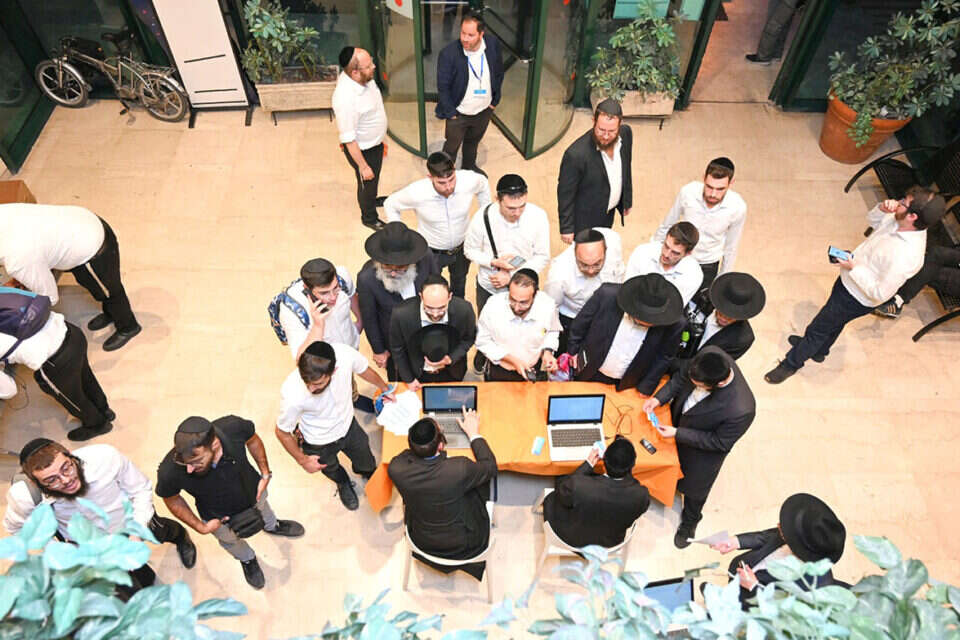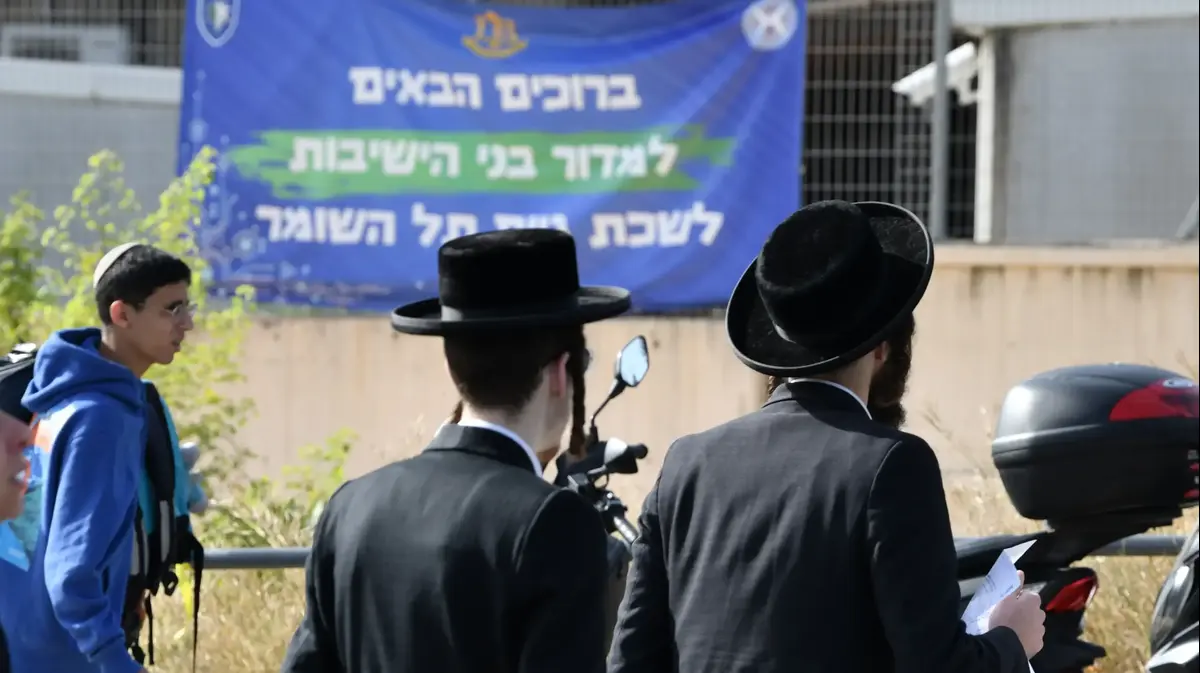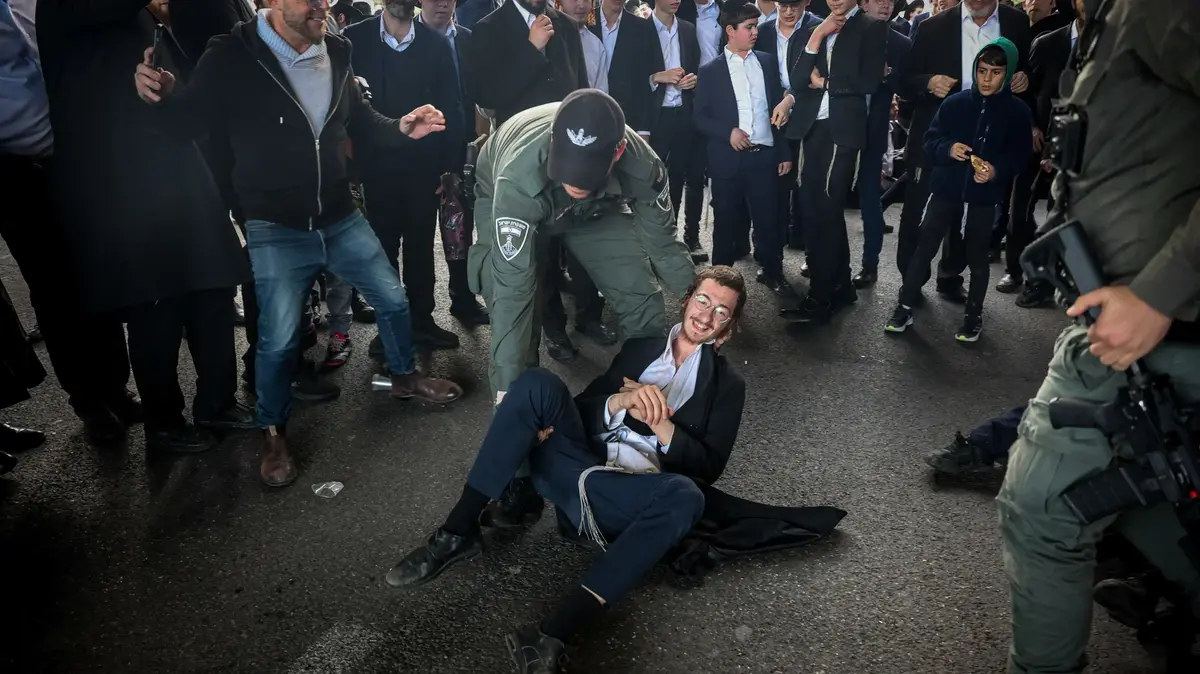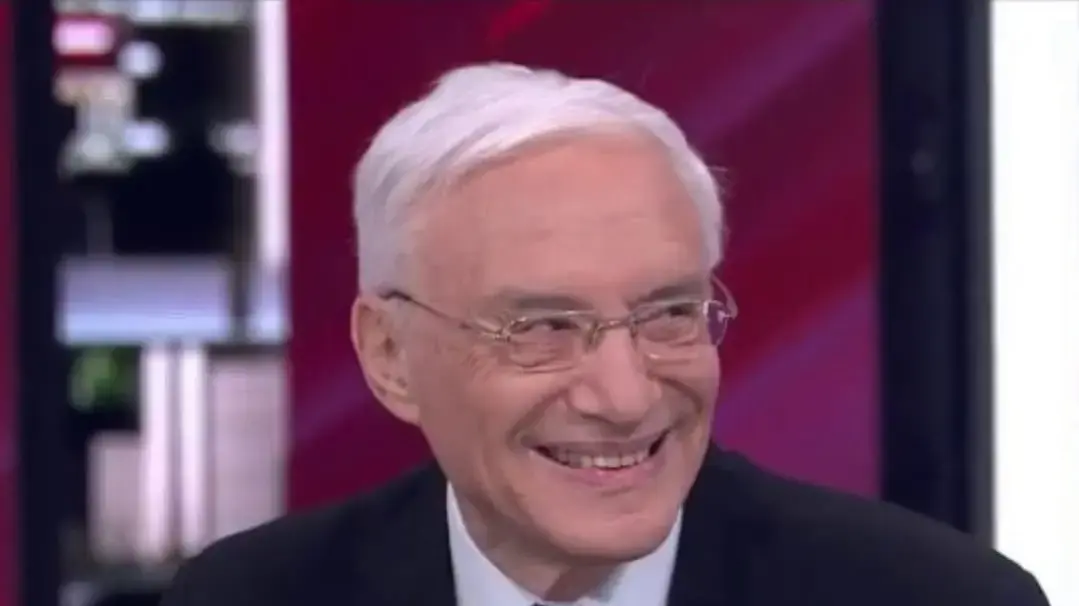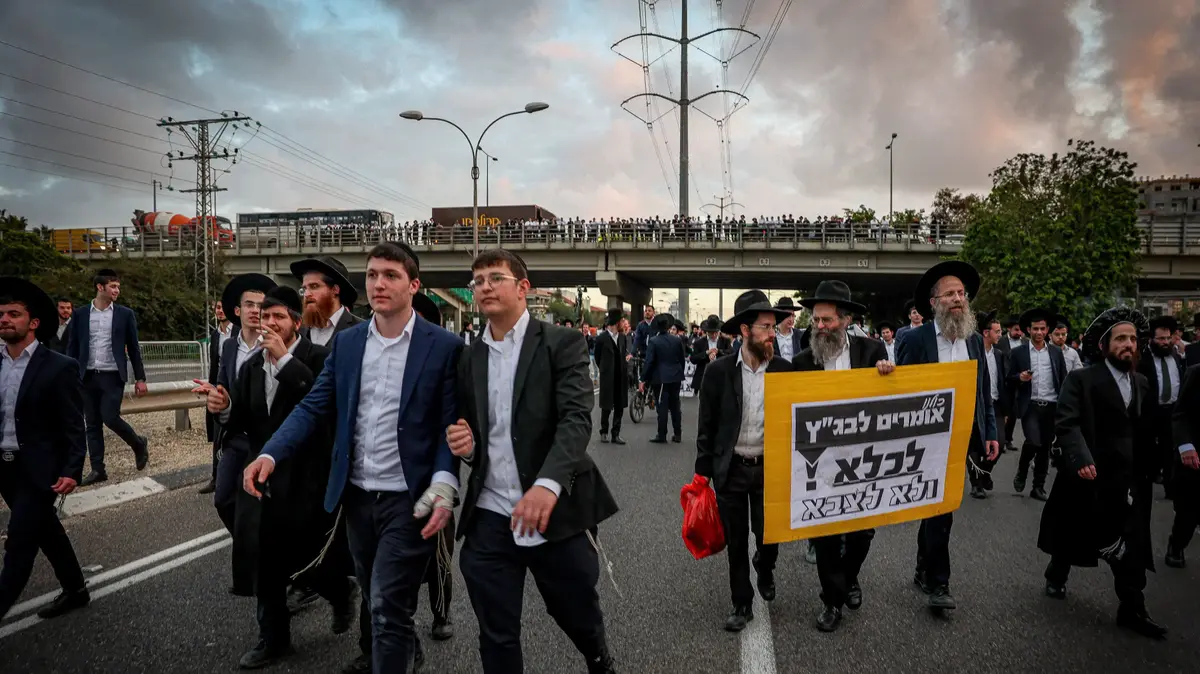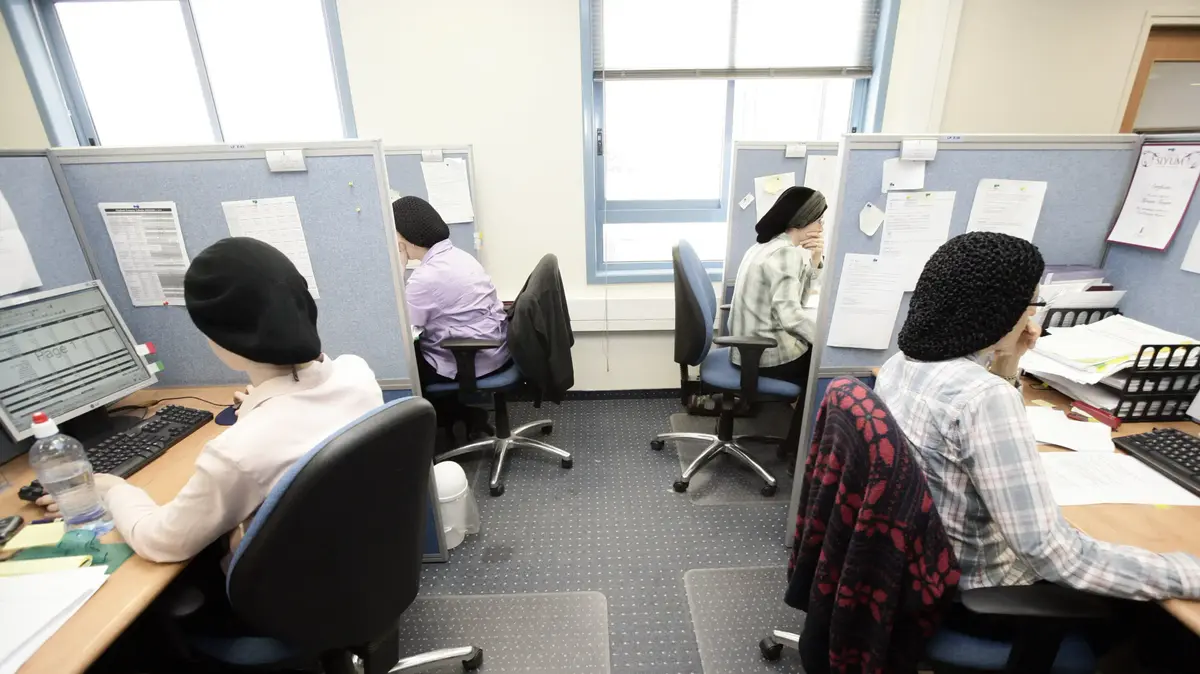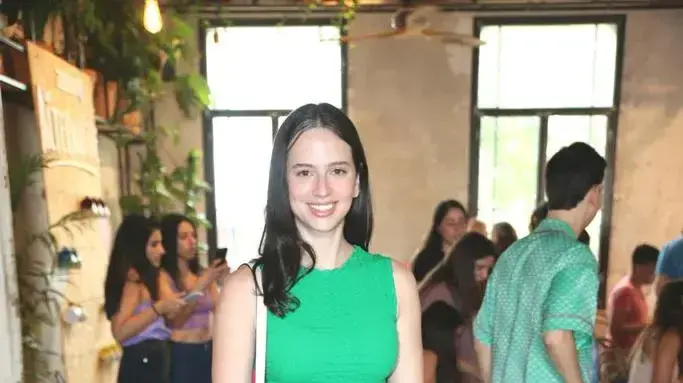I often win that my section in this supplement will be published next to the weekly column of the municipality of Linor. Last week, Irit wrote an important column about the fact that for the ultra-Orthodox, the job market, unlike the army, is the more convenient way to integrate into society. This week I will try to provide a glimpse into a fascinating path, which has the power to turn the vision into reality.
Let's start with the data.
According to the Knesset's Information and Research Center from June 2022, the proportion of Haredim of working age is 8% of the total population in Israel.
By 2065 this rate is expected to reach 26%.
However, as of today, only half of the ultra-Orthodox men of this age are working - far from the goal set by the Israeli government.
This is a grim reality that, if not changed, will cause severe poverty in ultra-Orthodox society and the collapse of the Israeli economy.
Among ultra-Orthodox women, the situation is better - 81% of them work, of which more than 60% are employed part-time.
The attempt to integrate ultra-Orthodox students into academic studies has encountered many difficulties, both because of the scholastic gaps in the absence of core studies and because of cultural and value gaps around the mixing of men and women and difficulty with universal and secular content.
It is worth saying this - as long as the State of Israel continues to allow ultra-Orthodox society to educate its children without core studies, it is hard to believe that mass integration of ultra-Orthodox people into the job market will only be possible through academic training.
And yet, who said you have to be a doctor of physics to bring home bread?
Today it is possible to make a decent living flying drones, operating cranes, picking locks, teaching driving, and also being a dentist or animator.
These professions do not require four years of study at the academy, but rather short-term professional courses.
Most of them do not require a high school diploma, so they fit like a glove into the current reality of ultra-Orthodox society.
In my opinion, this is a crooked reality, where children are raised ignorant of math and English within the framework of the state budget, but as long as this is the case, the solution should be professional training.
It's just a shame that the state's investment in professional training of workers from the entire population, not necessarily in ultra-Orthodox society, is minimal.
half work
"Until the end of the 1990s, there was a very massive investment by the state in professional courses," says Tali Nir, CEO and founder of the 121 Association - Engine for Social Change, "Every year there were 100,000 people who participated in professional courses at the expense of the state.
However, since then they began to dry up professional training, and five years ago it reached a low of only 4,000 people a year who participated in state-subsidized professional training.
Although there is some improvement, the situation is still far from satisfactory.
Israel is at the bottom of the table of OECD countries in terms of investment in employment programs.
In my eyes, this is our biggest national challenge in the economic-social field."
• The rate of working-age ultra-Orthodox is 8% of the total population in Israel
• Only about 50% of ultra-Orthodox men of this age work
• 81% of ultra-Orthodox women work, more than 60% of them part-time
• State investment in vocational training: between NIS 100 million and NIS
260 million shekels per year
In 2018, the 121 association founded "Hamkapza", to invest in the professions of tomorrow.
Nir: "This is a partnership of 50 business and social organizations. We sat together, researched the issue and realized that not only is there not enough training, but that the few trainings that exist are outdated and do not fit the needs of the economy, so even those who have already completed the training - could not find a job. For example, At the Electra company, we were told that in the state course that trains air conditioner installers, they teach about air conditioners that are no longer in use, so they do not employ the graduates. We contacted the relevant authorities in the government and explained that the employers must be partners in planning the training and the courses themselves, especially for field experience, and that way there will be a better placement.
"For two and a half decades, the Ministry of Finance resisted investing in training. It claimed that the employers would train the workforce on their own, but that simply did not happen. The numbers prove it. We proved to the Ministry of Finance that this was a market failure, and then they agreed to start investing in training in the Arab sector, the periphery and the ultra-orthodox sector This year, half of the courses are combined with the employers, but the road is still very long. You should know that today's job market is very dynamic. People not only need initial training. To become welders, for example, they also need to pay within the profession itself according to the changing technology, for example, learn to operate robots
"Nowadays, a warehouse manager has to manage it computerized, and in the field of construction, very innovative technologies have also entered the world, such as the visualization of the entire construction site that is projected on the field. At the same time, there are professions that are redundant and are no longer relevant to the market. Therefore, initial training for unskilled people should be promoted, and Training for people who need professional retraining or improvement of existing skills."
"I came for nothing"
According to data collected by the 121 association, the state invested NIS 12.4 billion in the academic year 2015. 6.5 billion of the total amount was invested in the academic teaching itself for the benefit of 337 thousand students. Half of the population in Israel does not attend the academy at all, and the state invests much less in it, and the professional trainings are An excellent example of this - between NIS 100 million and NIS 260 million at most each year in the last decade.
In 2021, which was a record year for investment in professional training due to the Corona crisis, 29,202 employees participated in the various courses.
In the first half of 2022 there was a decrease, and only 7,000 were trained.
How many of those who were trained were ultra-Orthodox?
too little.
The data indicates that in total, in the three and a half years between the beginning of 2019 and the middle of 2022, approximately 3,400 ultra-Orthodox women and men participated in state-funded professional training, out of approximately 350,000 ultra-Orthodox of working age.
For Mandy Eisen, 33, a married father of three who grew up in a Hasidic community in Jerusalem, the professional course was a gateway to the world of work: "I came from nothing. I was without a matriculation after years in yeshivot. I didn't join the army, but I realized that I had to make a living. As a child I worked a little with Ward, so I applied to Prog College with a request to study graphics. They were the pioneers in the field at the time. I slowly made progress. Today I have an independent business with a regular clientele. Over the years, I continued to specialize and took more courses in advertising and web design. I manage all the accounts of the firm perfectly, even though there are no I have a high school diploma in mathematics. I completed my English through the Internet. If I could get support for a course to improve my English, it would be very helpful. I think that if the state had invested more in professional courses, there would have been many more people coming out of ultra-Orthodox society and integrating into the job market."
The initial course in graphics that Mandy attended lasted about a year and a half, and was intended for ultra-Orthodox men.
The tuition was 13 thousand shekels, but he received 60 percent support.
"I would not have been able to enroll in this course without the support. I took a loan to pay the remaining 40 percent. I was able to repay the loan after I started working. It took me a while to establish myself, but today I am completely on my feet with a successful business, and I earn more than the average salary in the economy" .
How unusual is it to be a working man in ultra-Orthodox society?
"Today I am really not an exception. It is impossible to exist today without working. Those who only go to study have to give up many, many things in their life, and not everyone is able to do that."
Would you go to the academy?
"No. Also because it doesn't suit me to study with girls in the same class, and also because there is a problem with the content. I only go to places that have a rabbinic stamp on them. I trust the rabbis to check and do the right screening. Making a living is important, but the Torah is The highest value. You don't go beyond the highest value to make a living."
Milka Sadovsky (25), mother of four, ultra-Orthodox from Beit Shemesh, managed to integrate into "Snowball", a leading animation company in Israel that supplies content to Disney and Netflix.
This happened thanks to a 3D animation course she attended with a state subsidy.
"I studied visual communication at the seminary. It gave me an important foundation, but I knew it would be difficult for me to find a job in the field because the market, especially in ultra-Orthodox society, is flooded. I was quite lost. I was 19 at the time, already engaged, and then I heard that a new course was opening in cooperation with Snoball that was intended for women ultra-Orthodox at the 'Sior Mehot' school, and that it is possible to receive support from the Ministry of Economy. I left the seminary and enrolled in a course that lasted about a year. It costs NIS 20,000, and after the subsidy I paid NIS 7,000. It was a tremendous help and it gave me a very focused profession.
"I successfully completed the course, transferred to additional training within the Snowball company itself and started working. The company established a special center in Jerusalem in cooperation with the municipality for the benefit of ultra-Orthodox women. During the Corona period, the center was closed and today there is only a studio in Tel Aviv, but they allow me to work from home. I asked to work not full-time, Because it is more appropriate with the children, and they agreed to that as well. So today I work under conditions that are very suitable for me, with a salary that is slowly increasing and at a job that I really like."
High demand, long wait
One of the partners in the "Hamkatza" forum is the KMH Foundation - ultra-Orthodox professional advancement. The foundation has been operating for about a decade, and over the years has helped with scholarships and training for about 10,000 ultra-Orthodox. One - the most central and largest of all ten placement centers for ultra-Orthodox people established by the State of Israel.
"Professional training as far as ultra-Orthodox society is concerned is a win-win solution for all parties," says Attorney Avraham Yostman, VP of KMH, an ultra-Orthodox himself, "the main reason is the opposition that still exists in ultra-Orthodox society to academic studies.
It is very difficult for an ultra-Orthodox youth who has not studied core studies to be admitted to an academy for professions that have employment, such as law or business administration.
The academy, for its part, is also piling up difficulties, and a social and legal struggle has arisen around the question of separate study tracks, for some people it is a photographer in the hall.
"The hourglass of the ultra-Orthodox youth is running out quickly. They come to school after yeshiva at a relatively old age and with several children to support. Professional training gives them a solution that is both quick and significantly cheaper. All of this pushes many ultra-Orthodox youth to actually go to vocational training. Today we know that training "Professionalism can provide an employment solution, certainly in high-tech, where a great many workers who are kosher graduates without an academic degree have been hired. Also in other fields, thanks to vocational training, ultra-Orthodox youth find their place in the labor market."
To which professional courses do you refer people who come to the "Direction" center?
"First of all, we try to be very flexible with our customers. Not just to offer courses, but to understand what the person wants. Some people choose courses themselves in the place they want, which does not necessarily have to be ultra-Orthodox, and then we help them with financing in the voucher program, provided it is in a professional field which is on the list of professions defined by the state as required (for example, construction, framing, welding, computer processing, various fields in programming and cyber, automobile, machine operation, computers). The funding can reach between 70 and 90 percent of the cost of the course. Also, there are Courses that we develop especially, in cooperation with the state and with the employers. We locate the professions where there is a demand for workers, and try to direct ultra-Orthodox people there.
"We really like to be efficient. So, for example, we opened a course in operating drones with the flytech company, a guidance course for ultra-Orthodox women, and a course for dentists for ultra-Orthodox women. For several months now we have been trying to open more courses in areas where there is a lack of workers, but unfortunately we are currently encountering a lot of bureaucracy and obstacles Regulation. The Ministry of Health has agreed, for example, to open a course for dental hygienists who have graduated from the ultra-orthodox education system, but currently poses difficulties regarding opening such a course for men, even though there is a severe shortage of men in the field. At the same time, we are working on opening a course for female driving instructors. We have about 20 ultra-Orthodox women who signed up. Driving teachers are something that is sorely lacking in the ultra-orthodox sector, they will be hired, so we really like this idea. Unfortunately, it has been stuck in the Ministry of Transportation for a year."
Will something change for the better with the establishment of the new government, when now the ultra-orthodox parties are at the helm?
"The issue of ultra-Orthodox employment was part of the coalition agreements," says Yostman, who was one of the string-pullers in the coalition negotiations.
"Today, even if it doesn't come from the leadership from above, it comes from the field. The horses have run away from the stable, today there is a respectable option to work and be ultra-Orthodox. It is alive and well and it is already part of ultra-Orthodox society even if there are 'motives', as they say in Breslav, or difficulties.
"There are members of the Knesset like Uri Maklev from Torah Judaism and Moshe Arbel from Shas, for whom this issue is very important.
The professional trainings can be a very significant lever for this matter of integrating ultra-Orthodox in the employment market.
The weakness of the field of professional training is in our employees.
If the state decides to invest more in professional training and embrace the field, then there will definitely be a real change here."
Until that happens, Abigail (pseudonym), 41 years old and mother of five, ultra-Orthodox from Beit Shemesh, will continue to wait for the opening of the bureaucratic barriers at the Ministry of Transportation.
Today she works as a secretary, but dreams of advancing and becoming a driving instructor.
"I got my driver's license many years ago. In the last two years, many of my girlfriends got their licenses, and every time after the test they looked for someone to accompany them. Men are a people who like to stress, so they turned to me and asked me to accompany them. I saw that I was doing it really well and they told me that it was appropriate I want to be a driving instructor.
"Today the situation in Beit Shemesh is that those who want to study with a female teacher, have to wait between six months and eight months because of the lack of women in the field. I realized that this is also a field where women are lacking and that it also suits me, because I manage to give women a sense of security and I like working with humans".
Abigail began to look for where she could learn the field and arrived at the center of direction, where she was informed that such a course was about to start.
"Meanwhile, I've been waiting for a year for the Ministry of Transportation's bureaucracy, and it's not budging. It really sucks. Then they'll cry why ultra-Orthodox don't work enough. I gave up and the other women are ready to invest time and resources in this. The course costs NIS 30,000, and with the state subsidy it will cost NIS 9,000. In order to study the course I will have to leave my job, so the support here is for me a very important criterion that can be very helpful, so right now we are just waiting for something to move."
Meals at the factory
Efrat Shanan, Vice President of Human Resources at Beit Shemesh Motors - an international aircraft engine manufacturing company - tells about the integration of ultra-Orthodox workers: "The state decided 25 years ago to stop training workers who could be absorbed by us, because there are no more vocational schools in Israel.
A few years ago we had to build a new factory for a project of one of our biggest customers.
We needed 150 employees, so we decided to establish a training center with an investment of nearly NIS 3 million.
We also turned to the Ministry of Economy so that it would recognize our training course and help.
"Because we are in Beit Shemesh, we appealed to the ultra-Orthodox population and invited them for training. The courses can also be suitable for those who do not have a high school diploma, and did not study core studies. Very talented people from ultra-Orthodox society came to us, and it was worthwhile for us to invest in them. After the course, they undergo further internal training, and then They can advance. One of the graduates of the quality control course, a very talented ultra-Orthodox guy, is currently the director of the quality control department at one of our factories and is in charge of veteran employees. We brought Jewish meals to the factory, enlarged the synagogue, everything to make them comfortable.
We also employ ultra-Orthodox women in advertising, in the warehouse and in finance."
Shanan says that the factory works with the Ministry of Economy, which finances some of the courses, but not only is the budget not enough, but it also takes a long time before they approve it.
"I applied for the course in July, and it was only now approved. The Ministry of Economy has good people who want to do a good job, but suddenly their budget is stopped. For us, as a business enterprise, it is very difficult to depend on this. We need workers now, not in four months. Who else Helping us is the Tzorim association, which does holy work here and gives scholarships to the students in the courses. The course costs them no money. We give them transportation, meals, clothing, everything. An ultra-Orthodox person has a large family to feed, and this assistance is important."
The Ministry of Transportation stated: "We see great importance in the training of women in the automotive and driving professions. Our ministry welcomed the initiative to integrate ultra-Orthodox women as driving instructors. The licensing department requested to centrally receive all the relevant documents required for the application, in accordance with the procedures. Upon receipt of the documents, our office works to approve the application As early as possible in front of the work branch of the Ministry of Economy."
The Ministry of Health stated regarding the dental course for ultra-Orthodox men: "The Division for Dental Health is in continuous contact with the guidance center and gives it direction in submitting the application for the opening of the course in question, which is why the claim that the ministry is causing the delay is puzzling. The division assisted in opening a dental course for ultra-Orthodox women which is in advanced stages. We see There is great importance in the professional combination of men and women from diverse populations, who will work to promote oral and dental health in these populations and in general."
were we wrong
We will fix it!
If you found an error in the article, we would appreciate it if you shared it with us

